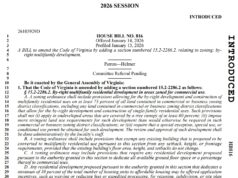by Cindy
You’re asleep in your bed in the middle of the night, when you suddenly hear a crash coming from the living room. Your dog freaks out and runs to the living room, barking and growling. Amid the noise of stomping feet and barking, you hear a gunshot and Rufus is suddenly quiet.
What do you do?
If you’re someone who owns a firearm for self-defense, this is exactly the kind of situation you probably had in mind. You quickly grab your gun from your nightstand, and run out your bedroom door into the dark hallway.
It’s not clear how this story ends, but it’s highly likely it ends with either you shooting your intruders, or your intruders shooting you, or both. If you’re someone who doesn’t own a firearm, you’re probably equally likely to end up being shot.
But here’s the rub. They aren’t intruders. They’re law enforcement officers, entering your house in the middle of the night, unannounced, with what’s called a “no-knock warrant” to search your house.
The 4th Amendment of the US Constitution guarantees a right to be secure against unreasonable search and seizure. That reasonableness was found by the Supreme Court in 1995 to extend to the manner of serving a warrant, determining that the common-law policy of “knock and announce” should be the default. However, a 1997 Supreme Court case determined that an exception was allowed in specific cases where “a reasonable suspicion that knocking and announcing their presence, under the particular circumstances, would be dangerous or futile, or that it would inhibit the effective investigation of the crime.”
This is another aspect of the “war on drugs.” No-knock warrants are issued to increase the odds of law enforcement finding the drugs before the individual has time to flush them down the toilet. Their use has skyrocketed from 3,000 per year in 1981 to at least 20,000 per year (50,000 estimated in 2005). And although they are meant to be an exception to the rule of “knock and announce” only in narrow cases, judges approve requests more than 95% of the time.
And the story ends in tragedy far too often. Breonna Taylor—shot eight times and killed in her own house as officers stormed in shooting with a no-knock warrant meant for someone else across town. 92-year-old Kathryn Johnston, who fired one shot over the head of the officers who broke down her door and entered her Atlanta house in search of crack cocaine they never found; they returned fire with 39 shots, several of which struck her and killed her. Or Berwyn Heights, Maryland mayor, Cheye Calvo, whose dogs were killed when a SWAT team stormed into his house with a no-knock warrant to investigate a package of marijuana that had been mailed to his house.
Ending no-knock warrants is one of those rare ideas for which there is bipartisan support. Republican Rand Paul has introduced a bill to ban the practice at the federal level. The federal Justice in Policing Act introduced by Democrats in Congress includes a ban. The South Carolina Supreme Court has temporarily banned the practice. Kentucky’s Republican Senate Leader is drafting a bill to ban the practice state-wide, and Oregon has banned no-knock warrants since 2009.
But there will be those who oppose. In the third House joint Courts of Justice/Militia, Police and Public Safety hearing, speakers from the Virginia State Police as well as the Fluvanna Sheriff’s office spoke against banning no-knock warrants, saying they oppose anything that “affects their crisis decision-making.” While I think we clearly don’t want to unnecessarily put law enforcement officers in life-threatening situations, there are many who argue that no-knock warrants do exactly that, by creating a fight or flight instinct in those who are being surprised by the officers. Additionally, even with knocking and announcing (often a matter of a few seconds), the officers plan the service, know well in advance the time and place, have protective gear available, choose numbers of officers according to the expected risk, and enter with weapons drawn, so the risks are minimized and don’t differ greatly depending on knocking and announcing or not.
This kind of tragedy doesn’t happen often fortunately, but it’s almost entirely avoidable. This is everyone’s worst nightmare—being suddenly attacked in your home while you’re doing nothing wrong. A typo in an address, a mistaken name, a bad tip, and a 26 year old EMT like Breonna Taylor is gone, her family distraught. Let’s fix this before we lose another innocent life.











